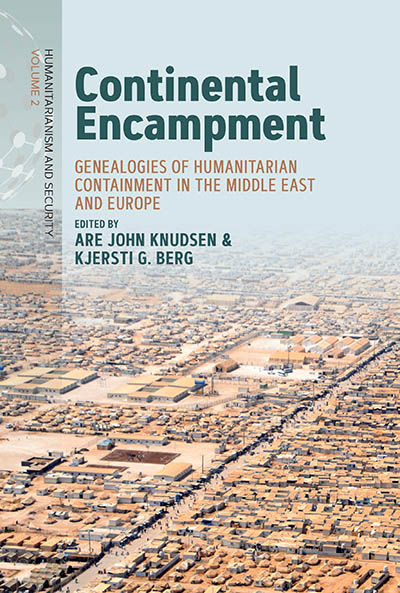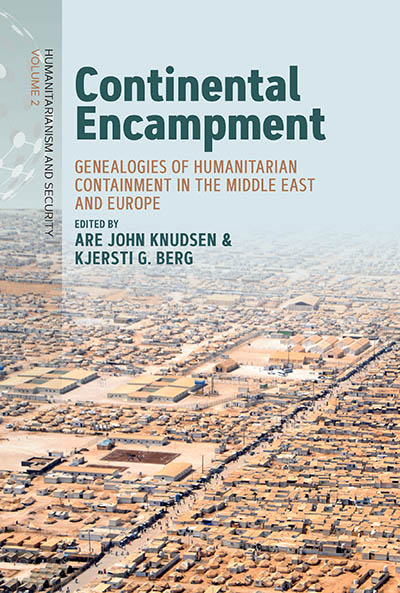
“Could,” ask Are John Knudsen and Kjersti Berg, “refugee camps, as traditionally understood, be scaled up to embrace a region hosting millions of refugees and migrants?”
Here they discuss their new book, CONTINENTAL ENCAMPMENT: GENEALOGIES OF HUMANITARIAN CONTAINMENT IN THE MIDDLE EAST AND EUROPE, which explores responses to mass migration and traces the genealogy of humanitarian containment, containment which we now see on a vast scale.
Beginning in 2012, the civil war in Syria displaced millions within the country and as refugees to neighbouring states. Three years later, more than a million had reached Europe, before the EU and member states closed ranks to stop ‘irregular migration’. Could the many measures to contain refugees and migrants in the Middle East region be the contours of a new ‘hosting continent’, one having features known from the burgeoning literature on refugee camps? Having studied refugee camps and shelters in Lebanon for nearly two decades, I knew the vast scholarly research on camps, while Kjersti had spent years doing archival research on Palestinian refugee camps and UNRWA camp policies. Could, we hypothesized, refugee camps, as traditionally understood, be scaled up to embrace a region now hosting millions of refugees and migrants, many supported by new aid modalities and contained by border regimes that was now being instituted across the region and Europe’s borderlands?
To explore this hypothesis, both current configurations, and the antecedents of encampment policies and practices, we contacted colleagues that could help us explore refugee management and containment starting with the early displacement crises in the late Ottoman Empire (Dawn Chatty), and the first refugee camps under British Army control (Ben White). As the British and French Mandates gave way to nation states displacing minorities, the many camps for Palestinian refugees came to define the region’s new ‘encampment’ (Kjersti Berg). Moving into the present, Syria resisted the UNHCR’s call for establishing camps for Iraqi refugees (Sophia Hoffmann) but established a new aid paradigm that contained Syrians displaced as ‘urban refugees’ in cities and towns in Lebanon (Are John Knudsen) and Jordan (Kamel Doraï and Pauline Piraud-Fournet). Further afield, the re-bordering of Europe served to stop, turn back, and return migrants and refugees in Turkey (Rebecca Bryant), the Balkans (Synnøve Bendixsen) and Italy’s Lampedusa (Antonio De Lauri).
Continental encampment encapsulates Europe’s ‘on-shoring’ strategy, one that mirror’s Australia’s ‘off-shoring’ of migrants to poor island states under the Pacific Solution and Sovereign Borders operations. Continental encampment has emerged as a ‘solution’ to mass migration and penetrates beyond the MENA-region deeply into to sub-Sahara Africa where return- and collaboration agreements have instituted joint border control and policing with the EUs’ border management agency (Frontex), to prevent migrants from reaching Europe. Many are stranded in Libya where human rights abuses abound, and the EU-funded Libyan coast guard intercepts and push-back migrants.
Continental containment differs from previous crises responses in its geographic reach, the magnitude of people interred and the range of measures – economic-humanitarian, political and legal – used to effect it. The policy implications of regional containment are dire, with the Middle East turned into Europe’s refugee and migrant hosting zone, thereby preventing many from accessing legitimate asylum procedures or being pushed back or returned without due process, as in the UK’s latest “small boats” policy. This has transformed Middle East ‘host countries’ into permanent holding zones and buffer states, with the EU evading its responsibilities under international law by paying third countries to serve as long-term hosts.
The multi- and bilateral donors not only use aid to sustain refugee livelihoods, but also compensate ‘host states’ for serving as ‘buffers’, a strategy that is miscast as strengthening resilience but is primarily a containment strategy that could endanger the stability of host states. The UN and aid agencies manage huge aid portfolios that sustain refugee livelihoods, but also serve to immobilize them, a process compounded by donor fatigue as time passes. This gives the Middle East camp-like features, where mixed groups of refugees and migrants subsist on humanitarian aid, with restrictions on mobility in ‘host states’ and internationally, across regions and divides. In this way, continental encampment is an inevitable result of preventing refugees and migrants from reaching Europe and makes humanitarian containment a new ‘durable solution’ to mass migration that will contain refugees and migrants indefinitely, hence an outgrowth of Orientalism’s imaginative geography of the Middle East.
As we are writing this, the devasting earthquake in Turkey and North Syria have cost more than 50,000 lives. In response, the EU has agreed on stricter measures to reduce the number of “irregular migrants” from Turkey towards Europe. Likewise, Greece has reinforced its border controls with Turkey, and plans to enlarge the wall along the border to “protect the European continent from illegal flows”. In mid-March 2023, the EU hosted a donor conference in Brussels to mobilise funds in support of the people in Turkey and Syria. The political fall-out from the disaster is a stark reminder of the perils of continental encampment, combining compassion with containment.
ARE JOHN KNUDSEN is Research Professor at the Chr. Michelsen Institute (CMI) and an International Fellow at the Institut Convergences Migrations (ICM), Paris. Knudsen specializes on forced displacement, camp-based and urban refugees in the Middle East, in particular Lebanon.
KJERSTI G. BERG is a Postdoctoral Researcher at CMI, Bergen, and Associate Professor at NLA University College, Norway. Kjersti is a historian and researches encampment, Palestinian refugees, UNRWA, and the Palestine Question.

CONTINENTAL ENCAMPMENT
Genealogies of Humanitarian Containment in the Middle East and Europe
Edited by Are John Knudsen and Kjersti G. Berg
Foreword by Michel Agier, Afterword by Thomas Hylland Eriksen
296 pages, 18 illus., bibliog., index, February 2023
Hardback 978-1-80073-844-7
eBook 978-1-80073-845-4
For the latest news on our books and journals please sign up for our email newsletters.
